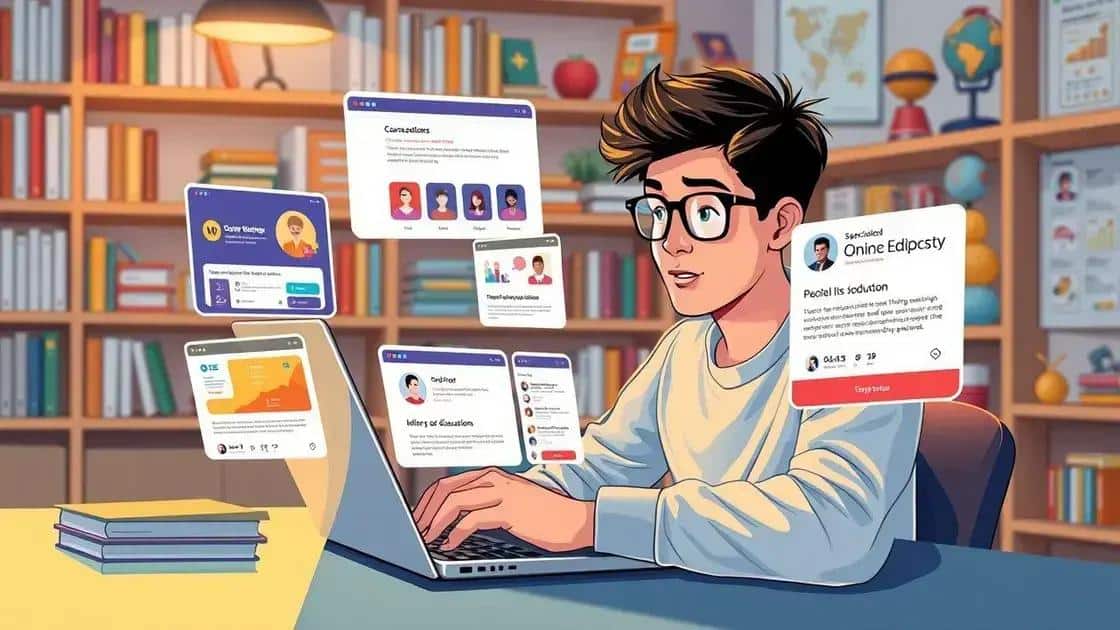Emergence of niche education platforms in today’s learning
Niche education platforms focus on specialized subjects, providing tailored learning experiences that enhance skill development, increase engagement, and offer flexibility compared to traditional education methods.
The emergence of niche education platforms is changing how individuals pursue knowledge and skills today. Have you noticed how diverse learning options have become? It seems like there’s something for everyone.
Understanding niche education platforms
Understanding niche education platforms is essential in today’s diverse learning environment. These platforms cater to specialized subjects, making education more accessible and tailored to individual needs.
What Are Niche Education Platforms?
Niche education platforms focus on specific fields or demographics. This specialization helps students find resources and connections that are most relevant to their interests and career goals.
Features of Niche Education Platforms
They often include interactive content, community support, and tailored curricula. This focus enhances engagement and retention among learners.
-
🎯 Targeted learning experiences
-
🌐 Community interactions and support
-
⚙️ Customizable courses
-
🧑🏫 Expert instructors in specialized fields
The availability of these platforms means that students can pursue learning at their own pace, accessing materials that suit their unique requirements. For example, someone interested in graphic design can find a platform that specializes in this area, connecting them with industry professionals.
Moreover, niche platforms often use innovative teaching methods, like gamification and real-time feedback. These methods not only hold learners’ interest but also enhance their comprehension and application of the material.
Benefits of Niche Education Platforms
Students experience a range of benefits when engaging with these specialized platforms. For one, personalized learning paths mean they can focus on their strengths and areas for improvement.
- Higher student engagement
- Access to niche experts
- Networking opportunities within specialized fields
- Flexible learning schedules
Ultimately, understanding niche education platforms leads to better educational outcomes for students, as they can pursue their passions and career aspirations with focused, expert guidance.
Benefits of niche education for learners
The benefits of niche education for learners are vast and impactful. By focusing on specific areas of interest, students can engage deeply in subjects that truly captivate them.
Personalized Learning Experience
Niche education allows for personalized learning experiences. Students often find that the content resonates more with their career aspirations and personal interests.
-
🎯 Tailored content specific to student needs
-
📚 Increased engagement through relevant material
-
⏳ Flexibility in learning pace and style
-
🔑 Access to specialized resources
Additionally, niche platforms can foster a sense of community among learners who share similar interests. This environment encourages collaboration and networking, allowing students to connect with peers and professionals.
Expertise from Industry Professionals
One major advantage is the access to experts in their fields. Niche platforms often feature instructors who are well-versed in specific subjects. This means learners are gaining valuable insights and knowledge directly from industry leaders.
- Insight into current industry trends
- Real-world applications of theoretical knowledge
- Mentorship opportunities
- Networking with professionals
Furthermore, the skills acquired through niche education are often more relevant to the job market. Students can build a portfolio or resume featuring specialized skills that stand out to employers.
In essence, learners benefit greatly from niche education platforms. They provide a focused approach to learning that can lead to higher satisfaction and success in achieving educational and career goals.
How niche platforms differ from traditional education
Understanding how niche platforms differ from traditional education is key to navigating today’s learning landscape. These platforms provide unique opportunities that traditional methods may not offer.
Specialization vs. Generalization
Niche platforms focus on specific subjects or skills, allowing for a deeper understanding of the material. In contrast, traditional education often aims to cover a broad range of topics, giving less attention to any single area.
-
🎯 Focused curriculum tailored to interests
-
🔑 Access to specialized resources and experts
-
📈 Enhanced student engagement through relevant content
The personalized approach in niche education acknowledges that learners have different needs and interests. While traditional education follows a set syllabus, niche platforms adapt to what the learner wants to explore.
Flexibility and Accessibility
Another significant difference is the flexibility offered by niche platforms. Learners can study at their own pace and on their own schedule, making it easier to balance education with other responsibilities. Traditional education models, on the other hand, usually require attendance at specific times and places.
- Self-paced learning opportunities
- Ability to access materials anytime and anywhere
- Interactive online features that enhance learning
This flexibility can lead to better retention of information, as students can revisit challenging concepts at their convenience. Furthermore, niche platforms often utilize technology to create immersive learning experiences that traditional classrooms may lack.
In summary, the differences between niche platforms and traditional education systems highlight the advantages of tailored, flexible learning environments that cater specifically to the needs of learners today.
Examples of successful niche education platforms

There are many successful niche education platforms that have emerged, showcasing the effectiveness of specialized learning. These platforms cater to specific interests, providing tailored resources that traditional education rarely offers.
Coursera
Coursera is a prime example of a platform that partners with universities to offer courses in specialized fields. It allows learners to take classes from renowned institutions, ranging from computer science to arts.
-
🎓 Access to industry-recognized certifications
-
🏫 Courses from top universities
-
⏰ Flexible learning schedules
This platform demonstrates how niche education can provide high-quality resources that are accessible to a global audience.
Skillshare
Another well-known platform is Skillshare, which focuses on creative skills such as design, photography, and writing. It encourages peer interaction and project-based learning.
- Community-driven courses
- Focus on practical skills
- Opportunity to connect with creators
By fostering a community of learners and creators, Skillshare highlights the benefits of collaborating with others in specialized fields.
Udacity
Udacity specializes in tech-related skills, offering programs in areas like data science, artificial intelligence, and programming. Its “Nanodegree” programs are designed to enhance career prospects.
-
🛠️ Hands-on projects evaluated by industry professionals
-
🤝 Partnerships with leading tech companies
-
🌍 Real-world application of skills
This approach appeals to learners looking to enter or advance in the tech industry, proving that niche education can align with job market demands.
Collectively, these platforms illustrate the power of niche education, providing resources and skills that meet the specific needs of learners in various fields.
Challenges faced by niche education providers
Niche education providers encounter various challenges that can impact their growth and effectiveness. Understanding these hurdles is crucial for developing successful strategies to overcome them.
Market Awareness and Competition
One of the main challenges is creating awareness about their existence. Many learners still turn to traditional education models, often unaware of the benefits of niche platforms. Increased competition from both new and established platforms also makes it difficult to attract users.
- Need for effective marketing strategies
- Standing out in a crowded marketplace
- Building credibility and trust with potential learners
Without a strong marketing plan, niche providers risk being overlooked by their target audience, limiting their growth potential.
Content Quality and Engagement
Another challenge lies in providing high-quality content that keeps learners engaged. Niche education platforms often rely on expert instructors to develop specialized curricula. However, finding qualified educators and ensuring they deliver effective teaching can be tough.
-
📚 Ensuring quality instructional materials
-
🎮 Maintaining engagement through interactive content
-
🔄 Regularly updating course offerings to stay relevant
Additionally, the platforms must create a community that fosters interaction among learners. A lack of engagement can lead to high dropout rates and dissatisfied users.
Technical Infrastructure
Technical challenges, such as maintaining a user-friendly interface and offering reliable access, are also significant. Niche education providers must invest in technology that supports smooth learning experiences. This can include ensuring that the platform is accessible on various devices.
- Providing a seamless user experience
- Ensuring the platform is mobile-friendly
- Addressing technical issues promptly
These challenges necessitate a careful approach to ensure that niche education platforms can thrive and effectively meet the needs of their learners.
The role of technology in niche education
Technology plays a critical role in enhancing niche education. It reshapes how information is delivered and accessed, making learning more engaging and effective.
Online Learning Platforms
Many niche education providers utilize online platforms to deliver their content. These platforms enable learners to access materials anytime and from anywhere, providing unparalleled flexibility.
-
🌐 Access to a wide range of courses and resources
-
⏳ Ability to learn at one’s own pace
-
🎥 Integration of multimedia elements to enhance understanding
This accessibility promotes lifelong learning, allowing students to develop skills on their own schedule, regardless of location.
Interactive Learning Tools
Moreover, technology fosters interactive learning. Tools like quizzes, discussion forums, and group projects encourage student participation. These features often lead to better engagement and understanding of the subject matter.
- Real-time feedback on assignments
- Opportunities for collaboration among peers
- Engaging simulations and gamified learning experiences
By incorporating these elements, niche education platforms create a vibrant learning environment that keeps students interested and motivated.
Data Analytics and Personalization
Additionally, technology allows for the use of data analytics to personalize learning experiences. Niche platforms can track learner progress and adapt courses accordingly. This ensures that learners receive content that meets their specific needs.
-
🛤️ Tailored learning paths based on performance
-
🔍 Identification of areas needing improvement
-
📚 Customized recommendations for further study
Through these approaches, technology not only enhances educational delivery but also supports learners in achieving their goals more effectively.
Future trends in niche educational platforms
Future trends in niche educational platforms are set to reshape the way learners engage with content. As technology advances, educational needs evolve, creating opportunities for innovation.
Increased Personalization
One of the major trends is the move towards increased personalization in education. Niche platforms will leverage data analytics to offer tailored learning experiences. This approach allows students to progress at their own pace and focus on areas that need improvement.
- Adaptive learning systems that change curriculum based on performance
- Customized recommendations for courses and resources
- Real-time feedback to improve learning outcomes
Such personalized education aligns better with individual goals, making learning more effective.
Integration of AI and Machine Learning
Another significant trend is the integration of Artificial Intelligence (AI) and Machine Learning in educational platforms. These technologies can enhance user experiences by automating tasks and providing intelligent suggestions.
-
🤖 Smart tutoring systems that guide learners through difficult concepts
-
📝 Automated grading systems for quicker feedback
-
🎯 AI-driven content curation based on interests and learning styles
This will help niche platforms adapt quickly to learner needs, creating a more dynamic educational environment.
Focus on Soft Skills
Additionally, there will be a growing emphasis on teaching soft skills through niche platforms. Critical thinking, communication, and collaboration will become key components of many courses. These skills are increasingly recognized as vital for career success.
- Courses focused on real-world problem solving
- Team-based projects to enhance collaboration
- Opportunities for peer feedback to improve communication
Integrating these elements will better prepare learners for the workforce.
Overall, the future of niche educational platforms will likely be marked by enhanced personalization, AI integration, and a strong focus on developing essential soft skills for tomorrow’s job market.
How to choose the right niche platform for you

Choosing the right niche platform can greatly enhance your learning experience. With so many options available, it’s important to consider several factors to find the best fit for your needs.
Identify Your Learning Goals
Start by determining what you want to achieve. Are you looking to develop specific skills, gain a certification, or explore a new hobby? Having clear learning goals will guide your decision.
-
📊 Consider your current skill level
-
❤️ Identify your interests and passion areas
-
🎯 Set realistic objectives for what you want to learn
This clarity will help narrow down your choices significantly.
Evaluate Course Content and Curriculum
Next, examine the course offerings on potential platforms. Look for platforms that provide courses that align with your learning goals. Check the curriculum details, including the topics covered and the format of the materials.
- Look for interactive elements like quizzes and discussions
- Consider the balance of theory and practical application
- Ensure the content is up-to-date and relevant
This will ensure you engage with material that is both interesting and valuable.
Check Instructor Credentials
Research the instructors’ qualifications and experience. Platforms featuring seasoned professionals can offer insights and knowledge that enrich your learning experience.
-
📚 Read reviews or testimonials from previous students
-
👨🏫 Look for instructors with a strong background in the subject matter
-
🎥 Evaluate their teaching style through available sample lessons
An experienced and well-reviewed instructor can make a significant difference in your learning journey.
Consider Community and Support
Being part of a learning community can enhance your experience. Check if the platform offers discussion forums, peer interactions, and other networking opportunities. Having access to support from fellow learners or mentors can provide encouragement and insights.
- Look for platforms with active discussion boards
- Assess mentorship opportunities
- Determine if there are additional resources for help
These elements contribute to a more engaging and supportive learning environment.
Ultimately, choosing the right niche platform is about aligning your personal goals with the features and support each platform offers, ensuring a fulfilling learning experience.
In summary, niche education platforms offer unique opportunities for tailored learning experiences. By focusing on specific interests and utilizing technology, these platforms can effectively engage learners. As you explore your options, remember to consider key factors like your learning goals, course content, instructor quality, and community support. Choosing the right niche platform will enhance your learning journey and help you achieve your educational aspirations!
FAQ – Frequently Asked Questions about Niche Education Platforms
What are niche education platforms?
Niche education platforms focus on specialized subjects or skills, providing tailored educational content that meets specific learner needs.
How can I determine my learning goals?
Consider what skills or knowledge you want to gain, and set clear, realistic objectives to guide your choice of platform.
Why is instructor quality important?
Highly qualified instructors can greatly enhance your learning experience by providing valuable insights and effective teaching methods.
What should I look for in community support?
A strong community support system, including forums and mentorship opportunities, can greatly enrich your learning experience by fostering collaboration.




